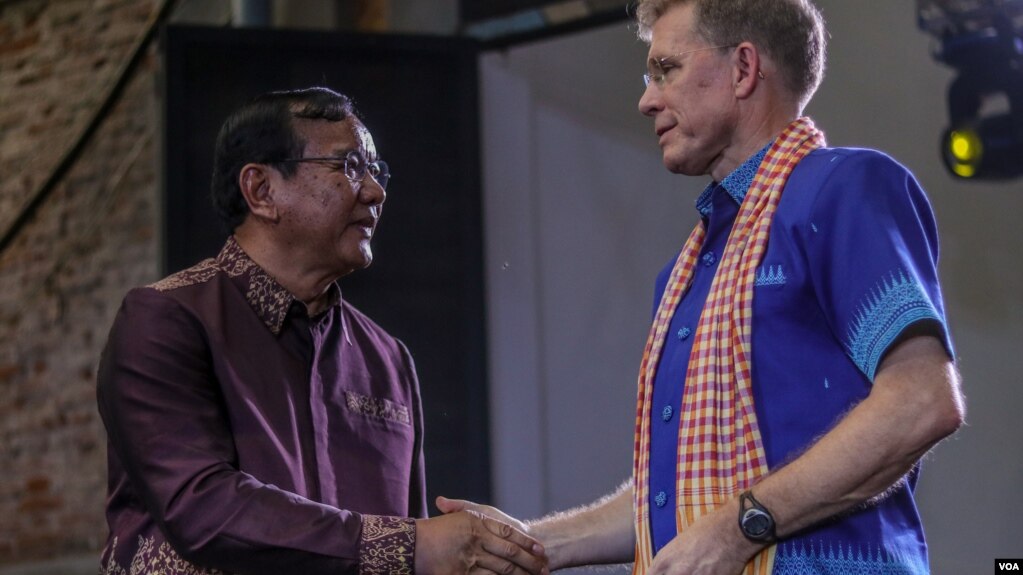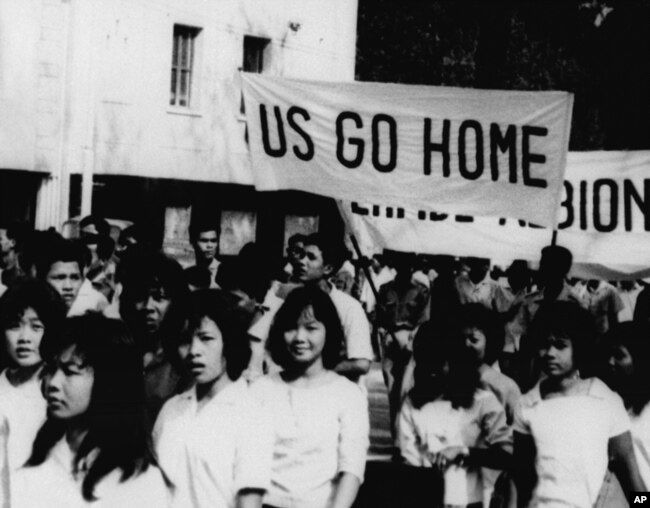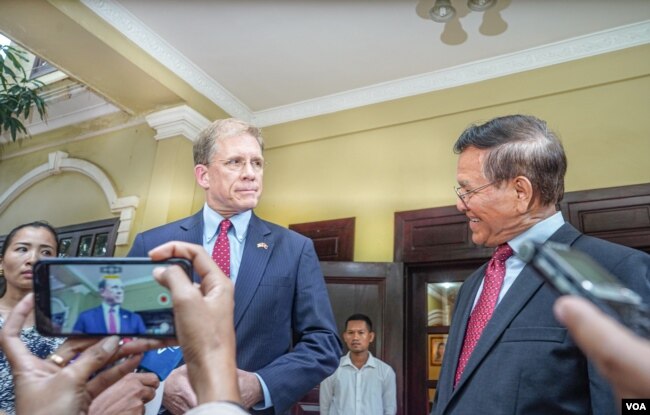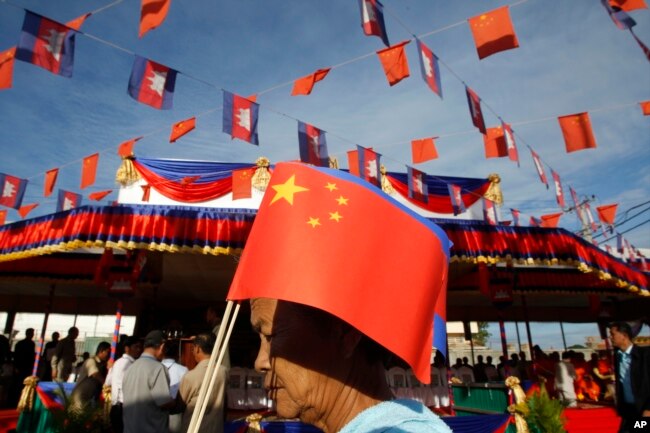Editorial by Khmer Circle:
Seen as China's "most faithful mistress" Cambodia has long been pushed into Beijing's dangerous embrace ever since Hun Sen realised that his singular tie with - and dependence upon - Hanoi's backing might not be enough to guarantee his dynastic grip on power. The Chinese - just like the Vietnamese - have zero qualms as to what Hun Sen and his regime do to the fifteen million Cambodians or to their future and, China's own strategic interest in the country - which has historically been important for China - requires only the unconditional compliance and co-operation of an authoritarian and selfish elite for the relationship to work. One of the reasons why Cambodia has emerged as China's most courted interest in the region is because the country's people themselves have always been something of a servile and obedient 'mistress' to the ruling elite with the least experience of personal happiness or liberty outside of that enforced wedlock, starting with the autocratic Sihanouk's lengthy reign in the fifties and sixties. The current outbreak of protests in neighbouring Thailand against military rule or the denial of democratic space there offers a timely study in contrast.
Whether the US or other Western powers that have "pushed" Cambodia further towards China is probably a moot point. If anything, the US and her Western allies - as well as Japan - have tended to overlooked the Cambodian regime's gross rights abuses in favour of maintaining cordial diplomatic ties and, in the US's case, to the extent of giving one of Hun Sen's sons - Hun Manet - a place at its prestigious military academy at West Point; a person widely tipped to succeed his father.
Was it not the US and other Western governments that helped to end the armed conflict in the eighties and early nineties? Was it not that same settlement and the resulting Paris Peace Accords that also enabled Hanoi and Hun Sen to liquidate his former armed adversaries and political rivals? Therefore, how much relevance and value could the US and its Western allies still offer to the Hun Sen regime beside token economic assistance?
🔺🔺🔺
25 August 2020
Say Mony
VOA Khmer

Cambodian Minister of Foreign Affairs Prak Sokhonn shakes hands with U.S. Ambassador to Cambodia W. Patrick Murphy at the 70th Anniversary of U.S.- Cambodia Diplomatic Relations celebration in Phnom Penh, Cambodia, January 8, 2020. (Aun Chhengpor/VOA Khmer)
“If the U.S. still pushes Cambodia further away, it will then go [to China],”
Sok Touch
WASHINGTON D.C. —
Observers and analysts have said the United States embassy was looking to reset its relationship with Cambodia on the back of the prolonged celebrations to mark 70 years since the establishment of diplomatic ties between the two countries.
In the first seven months of 2020, the U.S. Embassy in Phnom Penh has organized many events and activities, including conducting forums at the Royal Academy of Cambodia and media interviews on television and radio to promote the celebrations.
Ambassador W. Patrick Murphy has also hosted and moderated virtual discussions with some of his predecessors and leaders from the city of Lowell, Massachusetts, home to the second biggest Cambodian-American community in the U.S.
“I noticed [Patrick Murphy] has done a lot of activities both online and in person, which shows the U.S.’ interest in helping, and continuing to help, Cambodian people in almost all sectors as much as the U.S. can in accordance with bilateral agreements or ties between the U.S. and Cambodia,” said Pa Chanroeun, executive director of the Cambodian Institute for Democracy.
Since January 2020 when the embassy officially launched the celebrations, it has attempted to promote sectors and projects the U.S. has funded or assisted, such as in agriculture, women and equality, and the environment.
“Our mission here in the last couple of years, especially with Ambassador Murphy, has been to help achieve healthy, prosperous, democratic and independent Cambodia,” Arend Zwartjes, the U.S. embassy spokesperson, said in an interview in late July.

Teenage schoolgirls carry banners like "US Go Home" and "Perfidious Albion" through the street on March 11, 1964, in Phnom Penh before they sacked the US Embassy there. (AP Photo)
The U.S. began its diplomatic relationship with Cambodia on July 12, 1950, when Donald Heath, the first ambassador to Cambodia, presented his credentials to late King Norodom Sihanouk.
The bilateral ties have been mostly bumpy and increasingly tense in the last few years. In the run-up to the 2017 elections, senior Cambodian officials accused the U.S. of attempting to topple Prime Minister Hun Sen’s government in a so-called color revolution. It resulted in the ousting of the U.S.-based National Democratic Institute in 2017.
Weeks later, opposition leader Kem Sokha was arrested and charged with colluding with the U.S., and his party, the Cambodia National Rescue Party, was dissolved and its senior members banned from politics.
But, political observers say the relations may have become better in recent months because of the “soft yet firm” attitude of the new U.S. ambassador.
“The methods Mr. Ambassador has used so far seem to be more diplomatic, flexible and friendly, which reflects that the U.S. still sticks to its principles that it does a lot in the interest of Cambodian people and Cambodia as a whole,” said Pa Chanroeun.

U.S. Ambassador to Cambodia W. Patrick Murphy and opposition leader Kem Sokha deliver a joint press statement to reporters after their meeting at Kem Sokha's house in Phnom Penh, Cambodia, November 11, 2019. (Khan Sokummono/VOA Khmer)
In an opinion piece published in July 2020 by local newspapers, the ambassador also emphasized U.S. commitment to Cambodia.
Last year, Ambassador W. Patrick Murphy told VOA Khmer in an interview that the U.S. was not going to “interfere or to intervene” in Cambodia’s internal affairs. This mirrored the sentiment of a letter sent by President Donald Trump to Prime Minister Hun Sen in November 2019.
“We want to be a good friend and a good partner,” Murphy said in the VOA Khmer interview, adding that the U.S. also hoped for “concerted efforts to restore good practices when it comes to democracy and full respect for human rights.”
Ro Vannak, a co-founder of Cambodian Institute for Democracy, said the softening of the U.S.’ tone was more likely to prevent Cambodia’s further sway towards China, which is also currently engaged in diplomatic and trade skirmishes with the U.S.
“If the U.S. had pressured the Cambodian government hard, the latter would be turning even more closer to China, a move Washington does not want to happen,” he added.

FILE- A Cambodian woman holds a Chinese flag as she walks a friendship bridge between Cambodia and China during its inauguration ceremony in Takhmao, Kandal provincial town, south of Phnom Penh, Cambodia.
Sok Touch, president of Royal Academy of Cambodia, said bilateral relationships had improved with the new ambassador, but candidly admitted that a hardline position from the U.S. would push Cambodia toward China.
“If the U.S. still pushes Cambodia further away, it will then go [to China],” he said.
Murphy conducted a forum with Sok Touch on July 11, which marked the day diplomatic relations were established.
Sok Touch, who is also a personal adviser to Hun Sen, conducted numerous forums in 2016 and 2017 at the Royal Academy of Cambodia alleging the U.S. was conducting a color revolution in Cambodia and assisting the CNRP to topple the Hun Sen government.
Ear Sophal, associate professor of diplomacy and world affairs at Occidental College in California, said there were some doubts if the current “better” relations will last long. He noted that core differences remain between Phnom Penh and Washington, including views about the role and value of civil society organizations and freedom of expression.
“The honeymoon- if there ever was one- may soon be over,” Ear Sophal said.

1 comment:
Khmer traitor Hun Sen cared only about his gratitude toward his master Yuon who put him in power.
So he needs to do whatever he must do to please his master Yuon. His mission is to complete the Vietnamization of Cambodia. He cannot let the CNRP win the election to derail his commitment to Yuon.
Post a Comment